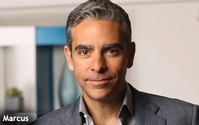Commentary
Hiring Signals Facebook Getting Serious About Mobile Payments
- by Mark Walsh @markfwal, June 11, 2014
 With
PayPal President David Marcus making the leap to Facebook, speculation has already begun
about how the move could help the social network jump start its payments business. In his slated role as VP, messaging products at Facebook, Marcus will oversee Facebook Messenger, the company's
stand-alone app with 200 million monthly users.
With
PayPal President David Marcus making the leap to Facebook, speculation has already begun
about how the move could help the social network jump start its payments business. In his slated role as VP, messaging products at Facebook, Marcus will oversee Facebook Messenger, the company's
stand-alone app with 200 million monthly users. But so far the app doesn’t carry advertising or allow users to send or receive money or make consumer purchases. Facebook has allowed the app’s user base to grow to critical mass globally unfettered by commerce, but that may be about to change with Marcus’ hiring.
He joined PayPal three years ago when it acquired Zong, the mobile payment startup he founded that allowed people to people to charge purchases through online games and social networks to their mobile phone bills. Prior to that, he was with mobile monetization firm Echovox. And after starting as VP, mobile, at PayPal, he became president in 2012.
Given Marcus’ background, his hiring could signal the first step toward Facebook building out mobile payments as a way to monetize its apps, starting with Facebook Messenger. “From my understanding, no definitive plans have been made as to what Messenger will evolve into, but I imagine it could turn into something that looks very much like Tencent’s WeChat or Braintree’s Venmo on steroids,” said Jordan McKee, a senior analyst at Yankee Group.
China-based messaging app WeChat boasts more than 350 million monthly actives users and powers in-app and other transactions, while the Venmo app is used for making peer-to-peer payments via mobile. Considering those examples, and the steps other top messaging apps like Japan-based Line and Tango have taken to monetize their massive audiences through in-app purchases and advertising, it’s only a matter of time before Facebook follows the same path.
That said, Marcus won’t oversee WhatsApp, which has famously sworn off advertising under founder Jan Koum and will continue to be ad-free for the foreseeable future as part of Facebook. But Facebook’s homegrown messaging app could be more fertile ground for introducing some type of payment service or purchasing capability.
McKee also suggested that Facebook might initially roll out mobile payments in emerging markets in connection with its Internet.org project to bring affordable Internet access to developing regions. Providing Web access and other services via mobile devices is a key focus of that effort.
In that vein, Facebook last week acquired Pryte, a Finnish startup that seeks to deliver cheaper Internet access in emerging economies by offering time-limited use of specific apps. Ultimately, however, the social networking giant would likely roll out mobile payments in mature markets where it would have a better shot at making money from more affluent users.
To date, payments hasn’t amounted to much of a business for Facebook, despite predictions in past years that it would rival PayPal with its creation of a virtual currency, huge user base, and wide reach through Facebook Connect. Now it appears that Facebook is counting on a PayPal executive to finally make that prediction come true.



